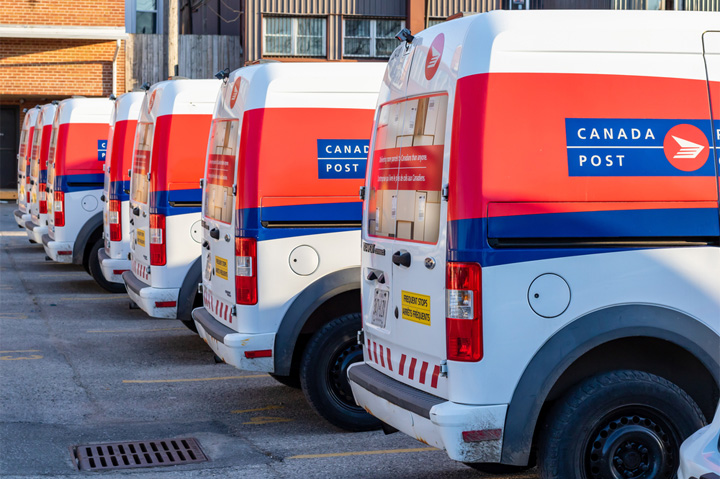CANADIAN NEWS November 21, 2024
Canadian Promo Braces for Impact From Postal Strike
More than 50,000 union members still have not returned to work for Canada Post, which has prevented critical pieces like product orders and client payments from reaching their final destinations.
Key Takeaways
• Labour Unrest & Strikes: Members of the Canadian Union of Postal Workers went on strike on Nov. 15 due to unresolved issues with Canada Post. It’s the latest in a series of labour disputes in Canada, including rail stoppages and port strikes over the past few months.
• Impact on Services: The strike has significantly disrupted postal services, as critical pieces are trapped within the system, and delays are expected to continue even after the strike ends. Businesses are facing increased costs and delays, with some having to switch to alternative carriers.
• Financial & Operational Challenges: Canada Post has been struggling financially due to factors like competition from companies such as Amazon, FedEx and UPS. The strike has exacerbated these challenges, highlighting the need for changes in Canada Post’s delivery model to remain competitive.
The hits keep on coming for Canada.
After several months of labour unrest, including rail stoppages and port strikes, over 50,000 members of the Canadian Union of Postal Workers (CUPW) walked off the job and headed to the picket lines on Nov. 15 after failed negotiations with Canada Post, the country’s primary postal service. A government-appointed special mediator is now working with both sides to help them come to an agreement.

Workers are striking over wages (Canada Post offered an 11.5% increase over four years, while CUPW wants 24%), pensions and medical leave, and want to be allowed to work overtime on weekends instead of Canada Post hiring contractors. The postal service, which has been struggling financially in recent years due to a slew of factors (including pressure from competitors like Amazon, FedEx and UPS) has in some cases replaced full-time employees with part-time workers to cut costs and has floated plans to implement seven-day delivery, which the union says could lead to more contractor hirings.
“Canada Post had the opportunity to prevent this strike, but it has refused to negotiate real solutions to the issues postal workers face every day,” the union said in a statement. “Instead, Canada Post left us no choice when it threatened to change our working conditions and leave our members exposed to layoffs.”
Canada Post says the work stoppage is impacting millions of Canadians ahead of the busy holiday season and warns that delays as a result of clearing out backlogs could continue into the new year once normal operations resume. Among the stuck postal pieces: government assistance cheques and passports, 85,000 of which are being held by Service Canada until the dispute comes to a resolution.
“We need to make changes to our delivery model to bring some flexibility in so we can be more competitive and grow our parcel business,” said Jon Hamilton, Canada Post’s vice president of strategic communications and stakeholder engagement. “We’re trying to grow our parcel business, we’re reducing our costs, but now, even with any plans we had, the union has shut down the postal system at the busiest time, when Canadians are counting on us.”
Canadian businesses of all sizes also depend on Canada Post to varying degrees, and that includes firms in promo. Tierney Culmer, owner of Culmer Pen Company (asi/47848) in Mississauga, ON, said its direct-to-consumer orders that are normally delivered by Canada Post will need to be picked up by UPS instead as long as the strike continues. “We’ll have no choice but to absorb the cost difference,” she said.
While Attraction (asi/37442), in Lac-Drolet, QC, mainly uses Canada Post, it can use other delivery services if necessary, said Marketing Manager François St-Pierre. “However, it’s possible that those carriers will also experience delays as a result of the strike,” he said. “That’s why we’re recommending that our clients place their holiday orders without delay.”
For others, the strike could result in significant impacts on finances. “The strike won’t affect our shipping operations,” said Tonja Zander, bilingual account manager at TPS Promotions and Incentives (asi/341409) in Markham, ON, “but it will affect our accounting operations, as many clients still pay by cheque.”
Lindsay Jones, owner of Rise Promotions LTD (asi/309183) in Edmonton, AB, and a 2024 ASI Media Distributor Salesperson Finalist, said if necessary, the company will have to have all clients pay by an electronic funds transfer method. He said the transition is a long time in coming.
“We’ve had cheques not show up and then been cashed at a bank in a different city,” said Jones. “Unless the cheque is insured, Canada Post says it’s not their concern.”
Laura Hansen, president of Vancouver-based Image Group Inc. (asi/230059), said her team has had to remind clients of their electronic payment options, especially those whose cheques are currently trapped somewhere in the postal system. She’s also concerned about fulfillment for the Pink Shirt Day online store, Image Group’s only business-to-customer program each year – the anti-bullying campaign takes place on Feb. 26 in British Columbia and Western Canada, and orders are already coming in.
“We use Canada Post to ship to remote locations, so we’re holding off on those for now,” she said. “The labour unrest from rail to ports to mail has been stressful. It makes you wonder what’s next.”
In August, management at Montreal-based Canadian National and Calgary-based Canadian Pacific Kansas City railways told union members not to come to work after contract negotiations broke down. The next day, Labour Minister Steve MacKinnon sent the dispute to the Canadian Industrial Relations Board (CIRB) for binding arbitration, which forced workers back to their jobs. And last month, union members at the Ports of Montreal, Vancouver and Prince Rupert went on strike; they too were ordered back to the docks by the CIRB and now continue to work through congestion as ships wait offshore for berths, some for almost two weeks.
